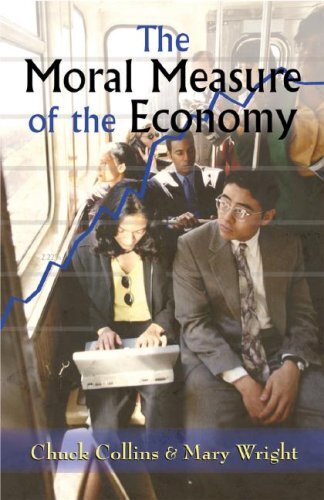Chuck Collins and Mary Wright, The Moral Measure of the Economy. Orbis Books, 2007.
Referenced in: Christian Perspectives on Economics and Public Policy
LifeandLeadership.com Summary
This is a substantive Christian treatise on the macro issues of U.S. economics, written from a Catholic perspective. The opening chapters overview Catholic teaching on respect for human life and dignity as well as economic justice, and offer a contrast between Gospel values and market values. The next two chapters analyze current American culture in areas such as income and wages, poverty, wealth, and inequality. This is followed by the author’s diagnosis of the root causes of economic injustice, which includes a thoughtful section challenging those who resist big government and taxation. They suggest that the combination of the private sector, the independent non-profit sector, and faith-based organizations do “not have the capacity to operate programs such as food stamps, affordable housing, and services for the mentally ill without governmental support.” (98) They oppose the tendency toward limited government and reduced taxes as “extremely individualistic values that reject social responsibility toward the needy and oppose societal solutions to common problems.” (98) They also discuss the role of global trade and the power of corporations.
This analysis is followed by a summary of nine moral measures that express “respect for all life and our recognition of human interconnection and solidarity.” (132-133) They also offer suggestions for how individuals and faith communities can act in solidarity to make a difference in their contexts and beyond.
One may not agree with all of authors’ conclusions, but then again, many conservatives and evangelicals have never entertained the issues discussed in this book. Resources featured in the resource guide on Economics by authors such as Ron Sider, Jim Wallis and John Schneider call Christians to the responsible use of their individual and congregational wealth. Collins and Wright address the issues on a more macro-economic, political level, laying out the implications of biblical teachings on poverty and wealth on that scale. Balance this with Blomberg’s Neither Poverty Nor Riches.
From the Publisher
In this clear and penetrating book, Chuck Collins and Mary Wright draw on principles of Catholic Social Teaching to evaluate our economy and lay out practical steps toward establishing an economy “as if people mattered.”
About the Author
Chuck Collins is a senior scholar at the Institute for Policy Studies where he directs the Program on Inequality and the Common Good. He is cofounder of Wealth for the Common Good, a national network of business leaders and high net worth individuals concerned about shared prosperity and fair taxation. He is a national expert on economic inequality, tax policy, corporate power and class privilege and power. He lives in Boston, Mass.
Mary Wright was the Education Coordinator at Catholic Campaign for Human Development, USCCB, for 12 years, and is now on staff at Just Faith Ministries in Louisville, KY. Previously, she served for 14 years at the Human Rights Office of the Archdiocese of St. Louis, as the CCHD Director.
***For additional information on this resource, including reviews, click the bookstore links. Check the reference at page top or the links below for resource guides on related topics.***
Related Areas
See Other Resource Guides on Christian Social Ministry:
- Theological and Philosophical Foundations of Social Ministry
- Spirituality for Ministry of Social Compassion and Justice
- Strategies For Christian Social Ministry
- Perspectives and Strategies For Social Ministry Among the Urban Poor, Urban Ministry
- Christian Perspectives on Political Theory and Church-State Relations
- Christian Perspectives on Economics and Public Policy


